DISCLAIMER:
This ethnographer approached her surroundings prepared to perceive the interactions that reveal romantic threads between people, at the expense of all the innocent single humans wandering around that infer these observations do not construct the majority. But I can write with confidence that they do construct the behavior of the majority of romantic couples in a natural foods grocery store on a Sunday evening.
WHOLE FOODS MARKET- VENICE, CALIFORNIA
Romance is In the Air
In my observations I made note of various couples' age, dress, conversation rate, ease of smile, and physical closeness. The first portion of my ethnographic activity was located at the lunch tables near the registers. This allowed me a unique look into the behavior of people with each other during money exchanges. Numerous times there were perfectly typical scenarios in which the couples, almost exclusively heterosexual, middle-class fashion, one-third bi-racial, would breeze through the checkout line with well-paced conversation, pay for their bill - equivalent ratio of men and women - and leave smiling with each other. An equal number of couples waited in line silently, seeming to wait out the social obligation that comes with eating nowadays.
I glimpsed a few notable moments of coupledom in passing. There were at least three heterosexual pairs in which the fashions were indistinguishable from each other, uniformly asexual. For example, one in an upturned Polo collared shirt and jeans, the other in a long-sleeved plaid shirt and jeans. In this case the woman had the confident assurance that is usually associated with masculinity, and the man seemed happy to submit to the direction of the woman.
Other couples, ranging anywhere from the ages of early twenties to late fifties, sat in silence, staring into space past each other as they ate, or looking at their phones. These people would leave the table often walking many feet away from each other. There were two couples where the female took up all the time talking, but the man was mono-syllabic and put in minimal effort to maintain appearances. This struck me as an uncanny similarity to Maggie and Brick's relationship in "Cat on a Hot Tin Roof." (1955)
Since this particular grocery store has a wine bar, I thought it would be a shame for me to not determine a few behavioral differences between standing in line versus standing in wine. I was not disappointed to find the differences were marked.
There was one duo in particular that caught my attention. They were in their late fifties to early sixties, and they had their arms around each other the whole time they were picking out a bottle of wine. They were dressed for the evening and staring at each other in a way usually reserved for teenagers.
A conversation began with two strangers sitting nearby. The woman almost immediately dropped the information of her divorce, and though the man was not interested, she kept creeping into his personal space. He was not completely disregarding of her, and they had an interesting conversation about how the modern age will no longer produce the stacks of love letters she recently inherited from her grandparents.
I believe that I chose a good place to observe based on Raymond Williams' suggestion that culture be explored in terms of the "identifications and forms of culture" (Barker, p.45). This cultural marker represents the idea that cultural products and their purposes and forms generate and express meaning. The idea that such a high ratio of couples spend their Saturday evening in a high class grocery store tells me the symbology of the object, food, and their sharing of a meal, oftentimes can represent their union over consumption. I believe that food and alcohol are two of the biggest cultural identifiers in American culture, and targeting them led me to rich and interesting observations.
People behave differently depending on the stage that is set for them. In the wine bar area, people were more apt to open up on a personal level and discuss aspects of culture with strangers in a way they wouldn't with each other or cashiers by the registers. perhaps the couples that were eating outside at the tables would have been more intimate had they been eating over a glass of wine. It is impossible to judge romantic success by observation of conversation, but nonetheless the rate of conversation and intimacy was more frequent over wine despite the physical arrangement being identical. So if we are truly determined by our surroundings, then the arguments of Stuart Hall (Barker, p. 219-220) regarding the "postmodern subject" are spot-on. This movment is described as when "the subject assumes different identities at different times...Within us are contradictory identities, pulling in different directions..."(p. 220) By observing the differences between public behavior at casual lunch tables and an intimate wine bar, the idea that we are constructed by culture is certainly demonstrated by this ethnology.
In my specific observation location, a liberal beach town, the demographic reflects one of the most forward thinking areas of the world in regards to race, sex, gender, and feminism. In particular I was able to recognize postmodern feminism as described by Weedon (Barker, p.224). He argues that "sex and gender are social and cultural constructions that are not reducible to biology". This is known as an "anti-essentialist" stance, a position that defines masculinity and feminity as inessential "universal and eternal categories" (Barker p. 224). When considering these modern ideas against Simone de Beauvoir's radical, critical, attacks against society and women, particularly the "master/slave relationship" (Beauvoir, "The Second Sex": Intro) her ideas can appear harsh and outdated. I observed in these romantic contexts that women's opinions and ideas could be openly expressed and considered. This was not at the expense of the men's voice-I observed them also being perfectly capable of letting go of the stigmas that come with masculinity.
As a superficial example, in the case of the couples that I referred to as having "androgynous fashion", neither bore any negative consequences to the arrangement. In fact, it felt refreshingly healthy in their contexts. Perhaps this is attributed more to their cultural acceptance in their context as opposed to a strong self-identity, but their relationship is nonetheless constructive. As the women didn't feel pressure to go through the pain rituals of beauty, the men weren't concerned with posturing to feather their stamina or virility. They seemed comfortable and loving without posing to conform to a rigid ideal.
But even in couples that honored the traditional formulas of sex and gender were sweet and intimate with each other. The classic chivalry of yesteryear was prevalent in many couples, and a fifty-fifty ratio of these couples were biracial. Considering that biracial or androgynous romance today in other parts of the country would never be openly celebrated for fear of violent ridicule makes this particular observed community remarkable.
I'd like to use these observations to respond to a remark in the text 'Romantic Comedy: Boy Meets Girl Meets Genre' by Tamar Jeffers McDonald- "[Romantic] films do not just reflect reality, they help to create it too...a closer look at what the underlying ideology of the romantic comedy wants to foster in its audiences indicates why film studios go on and on providing fairytales for adults." (p. 17) This ties in with one of the tenants of Althusser's philosophy of social formation via ideology, arguing that a subject does not create its own agency, but is an 'effect' of structures (Barker p.63). I agree that fiction helps shape reality, but I disagree directly with McDonald and indirectly with Althusser that it is the film studio providing the fairytale to the reality. If the fantasy didn't resonate with a genuine part of a person's reality it wouldn't be successful. I believe that it is the audience that hopes, yearns, begs to have their fantasies justified and reinforced by the media they consume.
There was enough observational evidence to suggest that although two people would spend time together, they were not necessarily interested in each other the way a romantic comedy would lead us to believe. Have these couples subscribed to an alternative ideal- perhaps the ideal that love does not exist? In their own realities, I am certain they prove the rule. But what of the couples that exude happiness, intimacy, dare I say, romance? A less happy couple might predict that their love is fleeting, temporary, that soon enough they will tire of each other and find someone else. But this is not what the loving couple wants to believe, and it is not what a romantic film portrays. It is in attempting to live up to the ideal that is created, and it is the ideal that we replicate in our fantasies. Just as we dream our filmic war heroes are noble and well-intentioned, just as the virgin female victims of horror films are the ones to triumphantly survive, and just as the fictional underdogs get that winning punch at the last moment, there is a repeat frequency of recreating idealism in cinema. Ideologies are not created as direct models of reality, but as concentrations of the best aspects of our reality to display as attainable goals. Who's to say the odds of attaining the ideal is common, or easy? For most of us, it's about the journey of attempting.
Supermarket Wedding
WORKS CITED
1. Barker, Chris. "Questions of Culture and Ideology." Cultural Studies Theory and Practice. Los Angeles: SAGE, 2008. Print.
2. Williams, Tennessee. Cat on a Hot Tin Roof. New York: New Directions, 1955. Print.
3. McDonald, Tamar Jeffers. "Romantic Comedy and Genre." Romantic Comedy: Boy Meets Girl Meets Genre. London: Wallflower, 2007. Print.
4. Beauvoir, Simone De. "Intro to Feminism." Introduction. The Second Sex;. New York: Knopf, 1953. Print.
Monday, September 20, 2010
Wednesday, September 15, 2010
Jerry Maguire
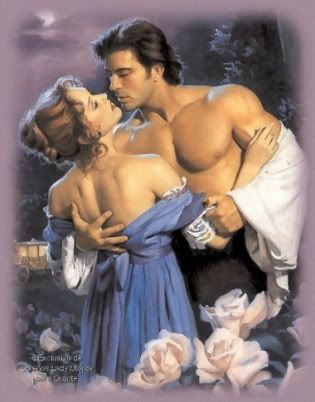
When reading the text 'Romantic Comedy: Boy Meets Girl Meets Genre' (McDonald), I had a lot of fun comparing the recent viewing of the film 'Jerry Maguire' with the typical expectations of the genre "romantic comedy". It was refreshing to know that amidst reading about the potential materialistic, commercialized, recycled and predictable stereotypes of the genre, at least one flick could stand alone as rejecting strict categorization while honoring type.
At first brief glance, 'Jerry Maguire' could be perceived as a masculine movie. After all, it's about football, football stars, and the politics of sports. This aspect allows strong accessibility to what might be considered typical male audiences.
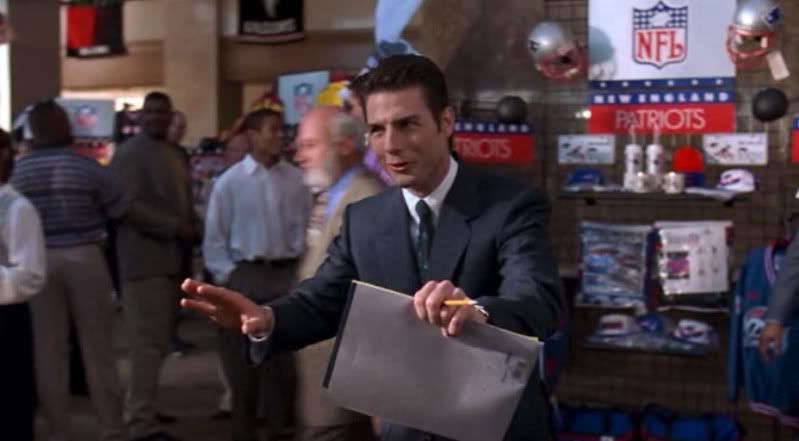
Jerry networking with the sports stars
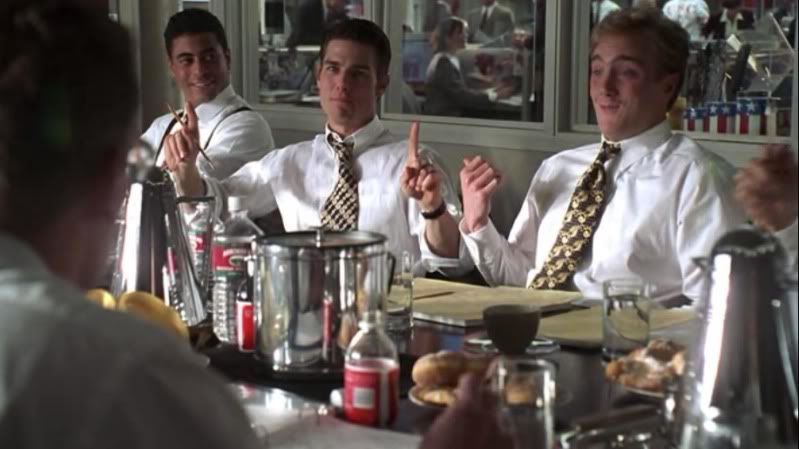
Jerry being a rock star at the company meeting
When most audiences see a romantic comedy, they expect "stories from the perspective of their female lead character...privileging her within the film as the site of audience identification." (p. 16) The point of view in 'Jerry Maguire' is completely male-oriented. Yet once we're allowed into the actual plot of the movie, it's discovered that the movie is really about is "boy meets, loses, regains girl" (Shumway p. 12), the pinnacle structure in the girl's club genre of rom-coms.
There are other notable romantic comedy staples in 'Jerry Maguire'. In 'Romantic Comedy', the concept of 'meet cute' is explained to be a frequent device in classic romantic comedies like the films of Billy Wilder (p. 12). 'Meet cute' is when the destined couple share a moment upon meeting that symbolically represents their eventual union. Jerry (Tom Cruise) and his love interest, Dorothy (Renee Zellweger), share a moment like this and more so.

Jerry and Dorothy "meeting cute"
Having just met, Jerry and Dorothy join hands with her son and swing him playfully back and forth as they have a casual chat. It is not just that their moment immediately comfortable. 'Jerry Maguire' manages to incorporate the theme of single mothers and the children's incorporation into romantic comedy with one perfectly symbolic moment.
Of course, it is not just the recurrence of rom-com stereotypes that make it a notable film. 'Jerry Maguire' also finds a unique way to use the genre to explore the spectrum of female identity. Both of Jerry's romantic interests represent parts of the "strong woman" spectrum.
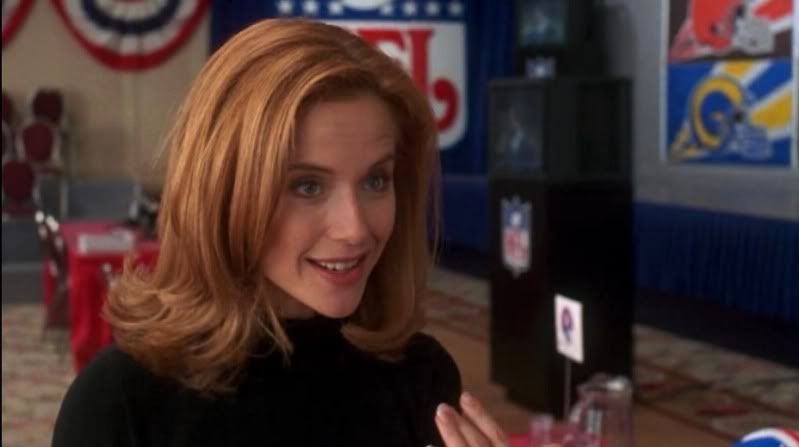
Avery Bishop (Kelly Preston) is Jerry's fiance, a fast-paced, career-oriented, sexually aggressive woman who knows what she wants yet won't shed a single tear to sacrifice it.

Dorothy Boyd is the frazzled single mother secretary who pines for Jerry from afar and follows him into a blind alley when he gets fired.
But these first impression descriptions contradict the strengths and weaknesses of their underlying character. Avery is strong-willed and motivated, but it's at the expense of her sensitivity, as seen in the moment when she harshly criticizes Jerry for trusting a man's word over a contract. Jerry absorbs her scorn, and when asked for loyalty, she replies that "...There is a sensitivity thing that some people have. I don't have it."
This sort of strength is misplaced, and seems to denounce all the wonderful traits that are associated with femininity- like caring, nurturing sensitivity. Dorothy, on the other hand, seems to overcompensate with sensitivity, questionably to a self-detriment. She is willing to sacrifice her job to help Jerry Maguire. But this doesn't necessarily make her a passive follower. She was willing to sacrifice her material, earthly possessions, but not the genuine love that breeds mutual caring and nurture. When it came to defending Jerry, like ensuring the representation of football star Rod Tidwell (Cuba Gooding Jr.), she was ready to pounce, defending his potential agency and philosophies vehemently. But she would not stand for being neglected when Jerry became distant and absent from their relationship. This could arguably make Dorothy the "true" modern woman, having it all, emotionally and psychologically, while raising a child by herself.
Children play such a vital part of the plot that it would be a shame not to acknowledge their influence on the world of the film. For me, this aspect conjures Simone de Beauvoir, and her sentiments that "The division of the sexes is a biological fact...The couple is a fundamental unity with its two halves riveted together, and the cleavage of society along the line of sex is impossible. Here is to be found the basic trait of woman: she is the Other in a totality of which the two components are necessary to one another." (Woman as Other, Intro) Here, in 1949, she is unveiling the truth that it would be biologically impossible for woman to escape sexism on an island away from men the way that say, blacks could escape racism by isolating whites without risking extinction. But at its best, the modern rom-com 'Jerry Maguire' was able to create a balanced relationship that took advantage of biological reliance while still being loyal and sensitive to both sexes mutual emotion reliance. Certainly this also upholds the romantic comedy's seeming #1 priority, perpetuation of the species.
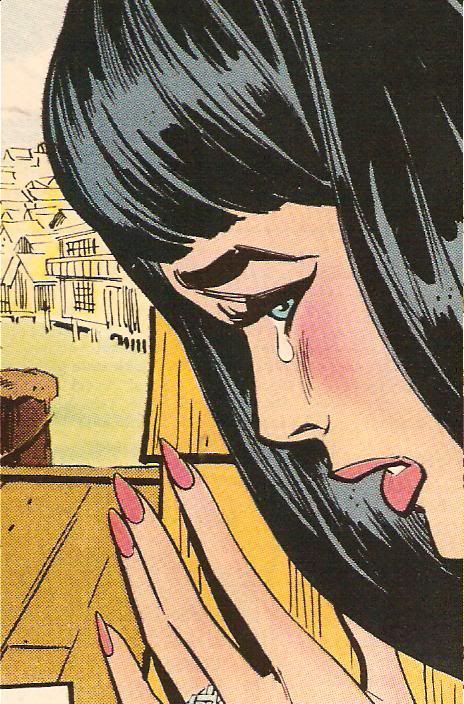
Friday, September 3, 2010
Top Ten Ways to Know If You Are a Serial Killer
The human experience consists of two fundamental, inarguable commonalities- those of language and self-consciousness. These are the foundations that contribute to the shaping of our identities. Humans may not be the fastest or strongest creatures on this planet, but it is our cunning social interactions that have elevated our status of dominance. (Well, that and opposable thumbs.) Without the intricate cooperation of analytical ideas we would not have been able to construct the vast civilizations we inhabit today. Language has also given humans the ability to construct the ethics and morals upon which our continued survival rely. According to Chris Barker of Cultural Studies: Theory and Practice, "...without language the very concept of personhood and identity would be unintelligible to us." (pg 218.) But the level of self-awareness that humanity has been gifted with has led to a long-standing and complicated investigation into exactly how we come to construct our interpretation of the self we were born with. When using language, whatever region it is born from, what do we mean when we say "I"? What is the contribution that "I" am making to "myself"? "Am "I" in control of "my" characteristics and values, or is it the civilization and culture "I" was born into that builds "me", without "my" permission?
Barker acknowledges that we have subjectivity in building our self-identities, but the implications are that we would have no basis for creating our selves without comparisons to the society we were born into. This argument is supported by many cultural scientists, including Stuart Hall. Stuart Hall is recognized for his article on 'The Fracturing of Identity', in which he argues that "The subject assumes different identities at different times, identities which are not unified around a coherent 'self'. Within us are contradictory identities, pulling in different directions..." (pg. 220) His arguments go on to suggest that we construct different identities depending on the different aspects of culture offered to us.
There is no better fictional example of these concepts than the character of Patrick Bateman in the novel/film, American Psycho. The film, directed by Mary Harron, based on the novel by Bret Easton Ellis, slices through American culture in the 1980's and provokes essential arguments in regards to its treatment of personal identity during this era. Patrick Bateman, as portrayed by Christian Bale, is a vain and materialistic Wall Street player. He also happens to be an imaginative fantasizer, constructing sexually violent and intricate daydreams in his day-to-day life.
The film opens at lunch time, where he sits with his contemporaries defending Jewish people against their low-spoken insults. With this scene, the film intentionally leads us to believe he has a confident self-identity that he is unafraid to express, even when his "friends" make fun of him for it. When we enter his home, we see it is largely white, blank. As he performs a series of rituals using a myriad of products to preserve an outer image, we begin to get a sense of mere superficiality. He explains that he uses a specific aftershave "...Because alcohol dries your face out, and makes you look older". He says this as though repeating a sales pitch. Even though he has justification for his purchase, it is an echo of the society that sold it to him. When faced with himself in reflections, he begins to be honest about his lack of self. "There is an idea of a Patrick Bateman, some kind of abstraction. But there is no real me- only an entity, something illusory. and though I can hide my cold gaze, and you can shake my hand and feel flesh gripping yours and maybe you can even sense our lifestyles are probably comparable, I simply am not there."
I (sic) believe the meaning of the book and film are to focus not on Bateman's identity as a Psycho, but as an American. Western civilization, and especially American civilization, places an immense amount of importance on our ability to define a self-identity. Individuality and free will are the forefront of American ideals. It is this pressure that Bateman is responding to. Because he feels he has no personal identity to speak of, that he is in fact an empty shell, he was forced to create a construction of a self that would be accepted by the individualistic society that surrounds him. If Patrick Bateman is merely a reflection, as the imagery of the film suggests through mirrors, then it is also his psychotic tendencies that were born of 80s American culture.
American media is commonly criticized for being exceptionally violent. The vastness of the pornography industry in America is mind-boggling. When paired with the philosophy of the "me" decade, is it a coincidence that some of the most notorious serial killers were born of the late 70's and early 80's, and almost exclusively American? John Wayne Gacy, Henry Lee Lucas, Richard Ramirez, Jeffrey Dahmer, and Ted Bundy were all active during this era, all were diagnosed as sociopaths, and all expressed the same sentiment of feeling empty, without identity. If the philosophies of Hall and Barker hold water, then the combination of violent and sexual media with an era of selfishness has evidently dangerous consequences.
Stuart Hall's 'fragmentary' argument that we are constructed from various reflections of our society construes 'American Psycho' as a cautionary tale for Western culture. Maybe we are placing so much importance on the individual to create a 'self' that we are neglecting the importance of the community we are drawing our 'selves' from. And although Barker comments that Western culture "is centrally concerned with questions of individual responsibility" (pg. 219), it could be that this is at the expense of a societal responsibility. With all these individuals running around, attempting to create a personal well-being, perhaps we have lost our sense of maintaining the greater good.
Below I have posted excerpts from the final interview of Ted Bundy and the sociological response to his comments. Although they focus more on how media impacts a persons' behavior, I found them relevant to highlight when discussing how the society we are born into shape the identities we create, and act upon.
In the following interview, Richard Ramirez directly responds to the questions posed in 'American Psycho', including "who are you?" and "do you have emotions?"
Barker acknowledges that we have subjectivity in building our self-identities, but the implications are that we would have no basis for creating our selves without comparisons to the society we were born into. This argument is supported by many cultural scientists, including Stuart Hall. Stuart Hall is recognized for his article on 'The Fracturing of Identity', in which he argues that "The subject assumes different identities at different times, identities which are not unified around a coherent 'self'. Within us are contradictory identities, pulling in different directions..." (pg. 220) His arguments go on to suggest that we construct different identities depending on the different aspects of culture offered to us.
There is no better fictional example of these concepts than the character of Patrick Bateman in the novel/film, American Psycho. The film, directed by Mary Harron, based on the novel by Bret Easton Ellis, slices through American culture in the 1980's and provokes essential arguments in regards to its treatment of personal identity during this era. Patrick Bateman, as portrayed by Christian Bale, is a vain and materialistic Wall Street player. He also happens to be an imaginative fantasizer, constructing sexually violent and intricate daydreams in his day-to-day life.
The film opens at lunch time, where he sits with his contemporaries defending Jewish people against their low-spoken insults. With this scene, the film intentionally leads us to believe he has a confident self-identity that he is unafraid to express, even when his "friends" make fun of him for it. When we enter his home, we see it is largely white, blank. As he performs a series of rituals using a myriad of products to preserve an outer image, we begin to get a sense of mere superficiality. He explains that he uses a specific aftershave "...Because alcohol dries your face out, and makes you look older". He says this as though repeating a sales pitch. Even though he has justification for his purchase, it is an echo of the society that sold it to him. When faced with himself in reflections, he begins to be honest about his lack of self. "There is an idea of a Patrick Bateman, some kind of abstraction. But there is no real me- only an entity, something illusory. and though I can hide my cold gaze, and you can shake my hand and feel flesh gripping yours and maybe you can even sense our lifestyles are probably comparable, I simply am not there."
I (sic) believe the meaning of the book and film are to focus not on Bateman's identity as a Psycho, but as an American. Western civilization, and especially American civilization, places an immense amount of importance on our ability to define a self-identity. Individuality and free will are the forefront of American ideals. It is this pressure that Bateman is responding to. Because he feels he has no personal identity to speak of, that he is in fact an empty shell, he was forced to create a construction of a self that would be accepted by the individualistic society that surrounds him. If Patrick Bateman is merely a reflection, as the imagery of the film suggests through mirrors, then it is also his psychotic tendencies that were born of 80s American culture.
American media is commonly criticized for being exceptionally violent. The vastness of the pornography industry in America is mind-boggling. When paired with the philosophy of the "me" decade, is it a coincidence that some of the most notorious serial killers were born of the late 70's and early 80's, and almost exclusively American? John Wayne Gacy, Henry Lee Lucas, Richard Ramirez, Jeffrey Dahmer, and Ted Bundy were all active during this era, all were diagnosed as sociopaths, and all expressed the same sentiment of feeling empty, without identity. If the philosophies of Hall and Barker hold water, then the combination of violent and sexual media with an era of selfishness has evidently dangerous consequences.
Stuart Hall's 'fragmentary' argument that we are constructed from various reflections of our society construes 'American Psycho' as a cautionary tale for Western culture. Maybe we are placing so much importance on the individual to create a 'self' that we are neglecting the importance of the community we are drawing our 'selves' from. And although Barker comments that Western culture "is centrally concerned with questions of individual responsibility" (pg. 219), it could be that this is at the expense of a societal responsibility. With all these individuals running around, attempting to create a personal well-being, perhaps we have lost our sense of maintaining the greater good.
Below I have posted excerpts from the final interview of Ted Bundy and the sociological response to his comments. Although they focus more on how media impacts a persons' behavior, I found them relevant to highlight when discussing how the society we are born into shape the identities we create, and act upon.
In the following interview, Richard Ramirez directly responds to the questions posed in 'American Psycho', including "who are you?" and "do you have emotions?"
Subscribe to:
Comments (Atom)